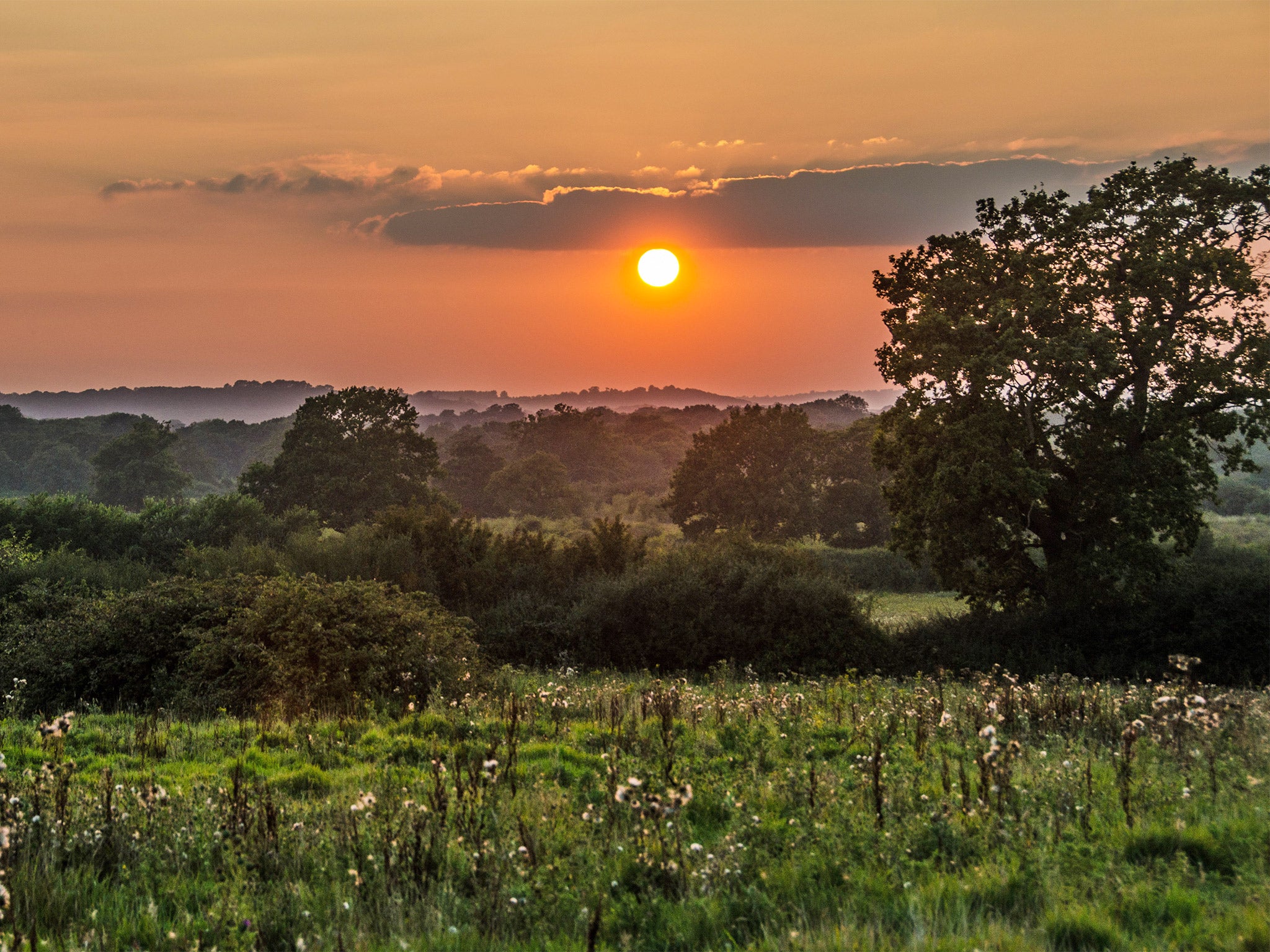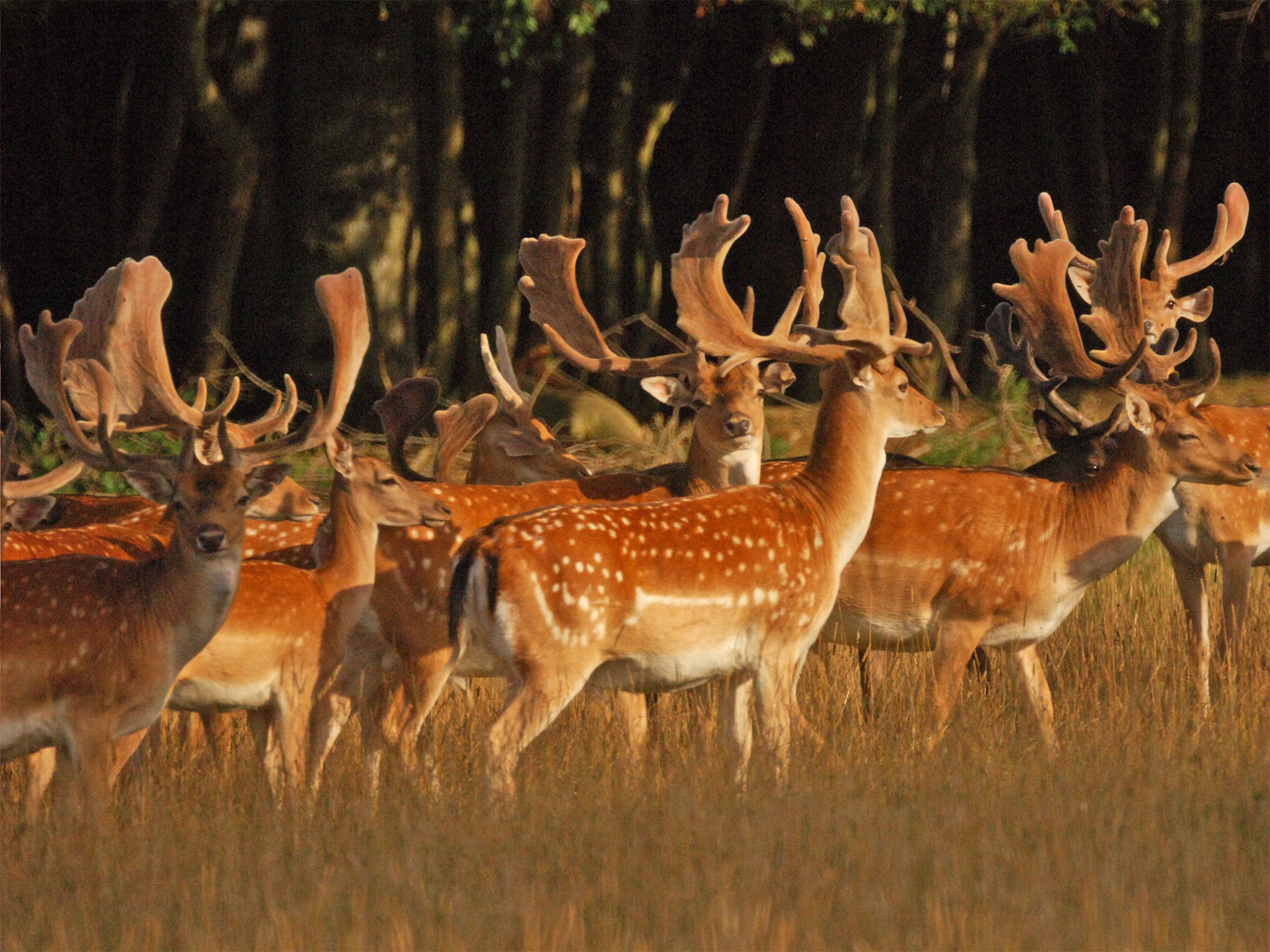Rewilding: Movement to restore wilderness areas is growing across Europe
Amy Jenkins joins a safari in Sussex to see a project in action

When I was a child I was taken on jam-jar safaris by my grandmother. We’d go down to the stream on the edge of her village; setting off with great excitement, reference books, fishing nets and an old fashioned magnifying glass. What would we find? Nothing spectacular, of course: some water boatmen, tadpoles, a minnow or two – but that didn’t matter because my grandmother, with her beady-eyed enthusiasm and knowledge of natural history, always brought the muddy contents of my jam-jar to thrilling life. On the way home, we picked wildflowers: buttercups and cow parsley to squash between the pages of a book. We listened out for the woodpecker and longed to see the kingfisher – a rare sighting was a thrill and a benediction of a sort.
A safari at the Knepp Wildland Project in West Sussex is very much in this vein. Knepp Castle and its 3,500 acre estate is home to Charles and Issy Burrell and has been in the family for 220 years. Until 15 years ago the couple farmed the land, but the soil was heavy clay and they struggled to make ends meet. Then a visit to the Oostvaardersplassen project in the Netherlands sent them in a new direction. The Dutch had returned some reclaimed lowlands in Flevoland to their Palaeolithic state and the success they are having – rare buzzards, goshawks, kestrels, kingfishers, eagles (and even a wolf) turned up – has launched a European “rewilding” movement. Indeed, George Monbiot helped launch the controversial Rewilding Britain movement only last month, in the hope of reintroducing up to 15 species to our islands, from lynx to grey whales. All across the continent there is farm land that is economically marginal. Why not use it to create new wildernesses, to encourage bio-diversity, to support disappearing species – in essence – to help heal our ailing planet?
Charles and Issy were converted and they hurried home to do… nothing. That is, they took the brave decision to shut down the farm and return their land to its own devices. It paid off. Nightingales, now rare in Britain, appeared to nest in the dense, thorny shrubs and Knepp is now home to two per cent of the UK’s nightingale population. In 2010 the elusive Purple Emperor butterfly arrived to nest in the estate’s emerging sallow. The Burrells now run safaris of all kinds. You can go to hear the nightingales in April and May or to see the butterflies in July. You can go on bee, bat and moth safaris, or to see deer rutting and learn about wildflowers and ancient trees. There’s also a wonderful camp site so that you can stay at Knepp in style – or bring your own tent if you prefer.

We booked onto a dusk safari and set out on a beautifully warm and golden evening, climbing into an Austrian Pinzgauer vehicle. Penny Green, the aptly-named resident ecologist, was our guide and we bounced along on the rutted ground (courtesy of the pigs) and the waves of her infectious enthusiasm. Penny knows exactly how many pairs of nightingales have come to visit Knepp, exactly where a grass snake might be found, exactly where to spot a little owl. I was excited. Forget lions and tigers and giraffes, an owl seems very magical to me – probably because they loom so large and mysterious in childhood books such as The Tale of Squirrel Nutkin.

Our first safari stop was at a wooden tree platform. There are several of these dotted around the estate and they are objects of beauty in and of themselves. Wide wooden steps curve around an ancient oak leading up to a spacious railed platform and a view that is remarkably like looking back in time: no fences, no roads, no machinery, no butchered hedges – and a posse of Exmoor ponies suddenly cantering into the sunny glade. I’ve never seen such cheerful ponies. They looked like they owned they place, which they do, of course. I was jealous for a moment.
The Burrells have introduced grazing animals at Knepp as this is how the British landscape would have been before farming. Without grazers the land would become densely wooded, so fallow deer, longhorn cattle and Tamworth pigs were brought in along with the ponies. The best sight of the evening was the fallow males “in velvet”, their majestic antlers rising out of the pasture like extraordinary modernist sculptures, all a-shimmer as their fine golden hairs caught the evening sun.
There is some light intervention at Knepp, of course. The owls are given nesting boxes and – charmingly – the snakes and slow worms get to cosy up under a piece of corrugated iron that warms in the sun. When Penny lifted the sheet of metal, we saw a grass snake slide nonchalantly away. It had been curled up on top of a nest of slow worms. Later, we caught sight of the little owl flapping out of his favourite tree and then stopped at one more tree platform to hear the frogs – as loud as ducks – on the lake as we were offered a glass of wine. Our final stop was to do some bat spotting with the help of a Batbox which picks up their sonic radar – undetectable to the human ear.

Back at the campsite, we cooked up delicious burgers in the delectable campsite kitchen which is built of reclaimed wood and covered by a large open sided tent. The pretty camping field at Knepp is dotted with a choice of interesting abodes: cosy shepherds huts, a tepee, a yurt and several spacious bell tents. All are beautifully furnished with well chosen antiques, invitingly soft double beds, blankets and, perhaps, a little writing desk or a wicker sofa. Every comfort has been thought of: reading lamps run off batteries, and the shepherd’s huts even have small wood burners and a kettle. Our bell tent had a bucket shower – or we could walk 50 yards to powerful indoor showers in fashionably slate-tiled wet rooms.
Almost my favourite thing was getting up in the morning and padding barefoot through the dewy grass to brew coffee in the kitchen tent – and then drinking it on a wooden swing seat looking out over the wildflower meadow. An experience as magical as the safaris themselves.
Travel Essentials
Knepp Wildland Safaris (01403 713 230; kneppsafaris.co.uk) are held at New Barn Farm in West Sussex and start at £25 per person. Accommodation starts at £140 for two nights in a bell tent, rising to £245 for a tepee.
The closest railway stations are Horsham, Christ’s Hospital, Billingshurst or Pulborough (Southern 08457 484950; nationalrail.co.uk). More information: visit-southeastengland.com
Join our commenting forum
Join thought-provoking conversations, follow other Independent readers and see their replies
0Comments